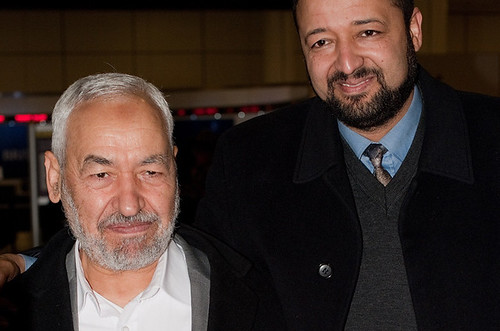
Tunisian Renaissance Party leader Ghannouchi returns home after the unbanning of his organization. The regional uprising began in Tunisia during mid-December 2010., a photo by Pan-African News Wire File Photos on Flickr.
Moderate Islamist party in Tunisia takes wide election lead
October 25, 2011 | 3:15 pm
Los Angeles Times
REPORTING FROM TUNIS, TUNISIA -- Tunisia’s moderate Islamist party was seeking to form a unity government Tuesday amid indications that it may win more than 40% of the seats in an assembly that will write a new constitution and test the cooperation between Islamists and secularists at building a democracy.
Tunisia, which inspired the so-called Arab Spring uprisings, is moving beyond decades of autocracy in an effort to put together a government based on the revolution that overthrew President Zine el Abidine ben Ali. But secularists and liberals fear that the apparent widespread victory by the Islamist party, Nahda, may jeopardize civil liberties and edge the country toward a strict Sharia law.
Nahda officials have said they want to forge alliances with all parties to draft a constitution that will set an example for other countries in a region gripped by upheaval and uncertainty. The negotiations will probably prove delicate as Nahda leaders, including Rachid Ghannouchi, who spent years in exile, now have the moment and possibly the mandate to establish their own style of political Islam.
"We will not shut anyone out of our consultations," Nahda campaign manager Abdelhamid Jlazzi said at the party’s headquarters. He added that Nahda would reach out to "political parties in the assembly and outside it, and civil society groups and unions. There will be continuity because we came to power via democracy, not with tanks."
Partial election results released Tuesday give Nahda 43% of the vote in Sunday’s election for a constituent assembly. That puts it far ahead of 87 other parties, including the main secularist party, the Progressive Democratic Party, which fared poorly. Despite its large percentage, Nahda, much better financed and organized than other parties, will probably be forced into a coalition under rules that prevent one party from dominating the assembly.
Fears of one-party domination could be heard in the chants of about 400 protesters outside the elections commission building in the capital, Tunis, on Tuesday. Demonstrators surrounded by squads of police officers yelled, "Where is the transparency?" while others carried signs denouncing Ghannouchi, who was twice imprisoned and tortured under Ben Ali, and returned from London months ago.
No comments:
Post a Comment